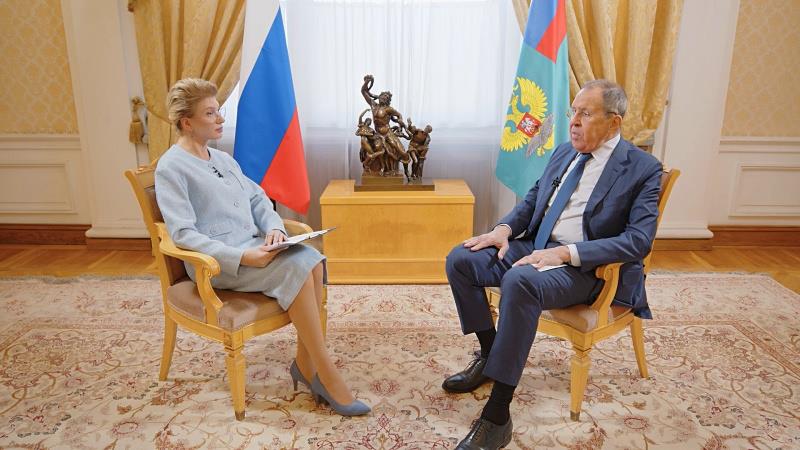
BRICS Summit In Kazan Shows Bloc's Growing Influence, Says Lavrov
Lavrov highlighted the success of the Kazan Declaration, which emphasised the need to significantly increase the share of the Global South and Global East in global governance mechanisms, including the United Nations Security Council, International Monetary Fund, World Bank, and World Trade Organization.
“The main 'pathos' of this declaration is the need to significantly increase the share of the Global South and Global East in the mechanisms of global governance, including the UN Security Council, IMF, World Bank, and WTO,” Lavrov said in his interview with TV BRICS.
The declaration also reflected the BRICS nations' desire for reform of existing international institutions. However, the group is also moving forward with plans for alternative payment mechanisms, interbank settlements using national currencies, and insurance mechanisms independent of the US dollar.
“Before the final part of the Russian presidency, everyone wants to create alternative payment mechanisms: interbank settlements using national currencies, insurance mechanisms that will not be directed against the system that has developed since World War II around the dollar as the pivot,” Lavrov said.
This sentiment was echoed throughout the summit and in meetings held throughout the year between finance ministers and heads of central banks. Recommendations have been developed for these alternative systems, and Brazil, as the next chair country, is expected to continue this work.
Lavrov highlighted several other accomplishments during Russia's chairmanship, including the establishment of a new category of“partner countries” within BRICS and a number of initiatives to increase inter-parliamentary cooperation.
The expansion of BRICS to include Egypt, Ethiopia, Iran, Saudi Arabia, and the United Arab Emirates, has strengthened the group's influence, according to Lavrov.
“The 'new' BRICS, already produces 35 per cent of the world's GDP, if you count it in purchasing power parity,” said Lavrov, adding that this exceeds the share of the G7 countries in the world's gross product by several per cent.
“The combined population of the countries in the grouping has surpassed 3.2 billion,” he said.
Lavrov also acknowledged the growing interest from other countries in joining BRICS, noting that over 30 nations have expressed interest in participating in events and initiatives.
“We have an agreement that as soon as we receive a response from an invited country, it will be announced that this state has joined BRICS as a partner country,” said Lavrov.“We assume that they will have the opportunity to participate in all BRICS events.”
Lavrov also addressed the group's progress in cultural and humanitarian cooperation. The BRICS Sports Games, held in June, were open to all comers, with over 80 participating countries and 27 sports disciplines.
In June, the first International Inter-Party Forum was held in Vladivostok, bringing together about 40 parties from BRICS states and partner countries.
Lavrov also highlighted the establishment of the BRICS+ Information and Cultural Media Centre in Mosco , which was opened in 2024.
Lavrov expressed optimism about the future of BRICS, saying he is confident that Brazil will continue to work on initiatives launched during Russia's chairmanship, including the creation of a grain exchange, an investment platform, and working groups on transport and nuclear medicine. He also anticipated continued work on reforming the international monetary and financial system and increasing the representation of developing countries within the UN Security Council.
“We have clearly reaffirmed our position: we support only increased representation of Asia, Africa, and Latin America,” said Lavrov.“The West is already unfairly represented there: of the fifteen members of the Security Council, six represent the West. That does not jibe with any statistics on the population, industrial production and size of the countries concerned. Specifically, we support India, Brazil and the collective initiative promoted by the African Union on Security Council reform.”
Lavrov also addressed the Ukrainian crisis, stating that the Kazan Declaration emphasized the need to respect the principles of the UN Charter in their entirety, including the principle of self-determination of peoples.
“The West prefers to talk about Ukraine, recalling only the principle of territorial integrity and formulating it as if there are no other principles in the UN Charter,” said Lavrov.“But there is also the principle of self-determination of peoples.”
He added that the West has ignored the actions of the Ukrainian government in violating the principle of human rights, including restrictions on the use of the Russian language.
Lavrov concluded by stating that he is pleased with the success of Russia's chairmanship of BRICS, particularly with the summit in Kazan.

Legal Disclaimer:
MENAFN provides the
information “as is” without warranty of any kind. We do not accept
any responsibility or liability for the accuracy, content, images,
videos, licenses, completeness, legality, or reliability of the information
contained in this article. If you have any complaints or copyright
issues related to this article, kindly contact the provider above.


















Comments
No comment